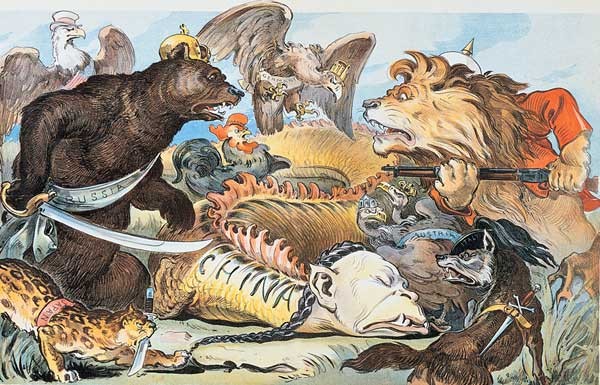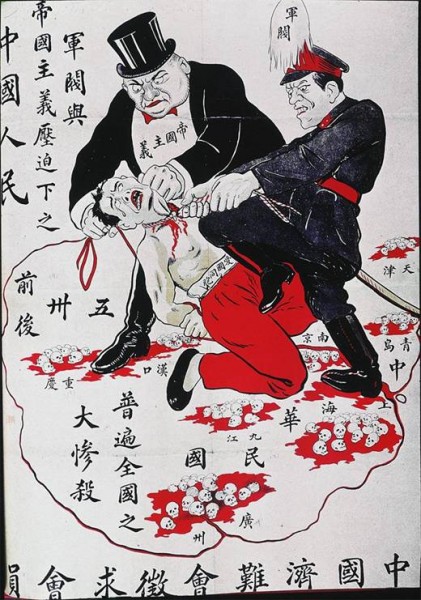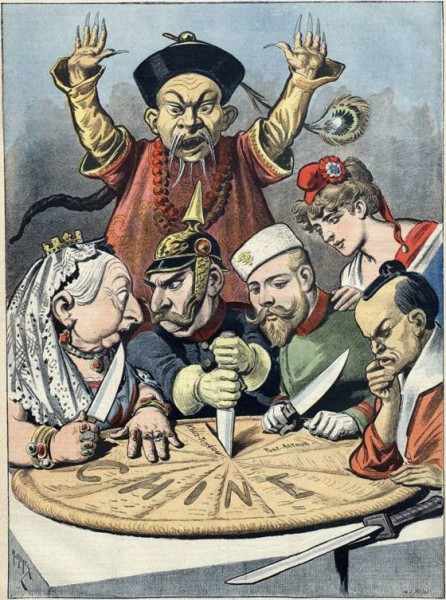The Countries That Controlled China During The Age of Imperialism
Beginning with the conclusion of the First Opium War in 1842, which saw China lose to the United Kingdom and sign the Treaty of Nanking, China entered its “Century of Humiliation”, or bainianguo chi. From that time until 1949, when the Chinese Communist Party conquered China and forced the Nationalist Party to flee to Taiwan, China endured an ignominious and desultory era when it was bullied by foreign invasions and unequal treaties that limited its power and wealth. A number of European countries and Japan took over parts of China as colonies or as spheres of influence, in which foreign nations made their own laws and treated Chinese as second-class citizens. Vast areas of China were under foreign control and would remain in this condition until after the end of World War II. Chinese reformers made it their goal to get rid of foreign rule and today cite China as a successful and independent country that has lots of influence around the world, instead of being manipulated by foreign powers. These are the countries that had a presence in China during the late 19th and early 20th centuries.

1. Japan
For many Chinese, Japan remains a source of hateful and bitter memories about imperialism and invasion. Japan wrestled with China for control of many Asian territories, and defeated China in the First Sino-Japanese War. The resulting Treaty of Shimonoseki gave Japan control of Taiwan and other islands in 1895, and forced China to pay money to Japan. Japan was about to acquire more Chinese territory in Manchuria and Shandong, but France, Germany, and Russia opposed this move and forced Japan to give up these ambitions in an alliance known as the Triple Intervention. This defeat was a huge blow in terms of money, land, and morale to China, which had viewed itself as superior to Japan for centuries. Japan also pushed Chinese influence out of Korea and made it a Japanese colony in 1910. Japan continued to control much of northern China and neighboring countries throughout the early 20th century, and invaded Manchuria in 1931. Japan pushed deeper into China during the 1930s, and attacked and destroyed many areas of China during World War II. Japan finally lost its entire colonial empire in 1945 when it was defeated in World War II.
Great Britain was viewed by many Chinese as the “arch-imperialist”, or the first and most powerful imperial power to invade China. Britain started imperialism in China by selling opium to the Chinese. When Chinese led by government official Lin Zexu destroyed opium and refused to allow any more sales of the drug, Britain declared war on China and won. China had to allow Britain to take Hong Kong as a colony, which it kept until 1997, and ceded a number of port cities to British control. Britain ended up ruling much of southern China and was a major colonial power in China.
3. France
Much of southern China was ruled by France, which included Yunnan, Guangxi, Guangdong, and the island of Hainan. France allied with Great Britain to fight China during the Second Opium War, which lasted from 1856 to 1860, and the two countries sacked and destroyed Bejing’s Old Summer Palace, or Yuanmingyuan, stealing many artifacts and treasures from the complex.
4. Russia
Russia controlled much of northern China, including parts that are now Mongolia and Inner Mongolia, northeast China, and tried extending its reach into Xinjiang. To this day, northeastern cities like Harbin and Dalian have plenty of Russian influence, as seen in Russian architecture, businesses, writing, and food. When the Bolsheviks overthrew the Russian imperial family and formed the Soviet Union, they at first promised to return their possessions to China, but eventually never did. Russia and China continued to have close relations and influence each other during the 1950s and 60s, as they were communist allies that cooperated economically and militarily.
5. Portugal
Portugal ruled a small but very crucial colony, the island of Macau, from 1557 to 1999. Macau was a trading post in a long chain of colonies that Portugal controlled, and it was the first and last colony a European country ruled in China. Macau was first rented to Portugal as a trading port and became a colony of the Portuguese empire in 1887. Portugal transferred Macau back to China on December 20, 1999, and Macau will have autonomy until at least 2049.
6. The United States
While the United States of America never had any colonies or spheres of influence in China, in 1899 American Secretary of State John Hay formulated the Open Door Policy. This policy stated that China would be open to trade with all countries on an equal basis, preventing any one country from totally dominating or interfering with treaty ports of other countries. America had colonies in the Philippines and Guam, and worried that it would be shut out of trade with China by the European countries. America also sent troops to form the Eight-Nation Alliance, which quashed the Boxer Rebellion in 1900. The Eight-Nation Alliance consisted of the United States, Great Britain, France, Germany, Japan, Italy, Austria-Hungary, and Russia.
7. Germany
Germany acquired its territory in China at a relatively late stage, and controlled only a small part of China compared to other countries. However, they left very deep and distinct marks on China during their brief period of rule. In 1897, two German Catholic priests were murdered by Chinese, and Germany, which had spent years looking for a place and time to settle in China, used this incident as a pretext to invade China. Germany received a 99 year lease on the Kiautschou Bay Concession on the Shandong Peninsula. The capital of this territory was Qingdao. The Germans devoted millions of dollars to improving Qingdao by building schools, sewage systems, harbors, banks, and factories, transforming the city into one of the most modern and advanced cities in China. Even today, Qingdao is ranked as one of China’s most livable cities. Many buildings in Qingdao are still built in the German style, and the Germans introduced beer to Qingdao, founding the Qingdao brewery and making beer synonymous with the city.





Hm all bullshit false chinese baby eater bastards
what were you smoking?